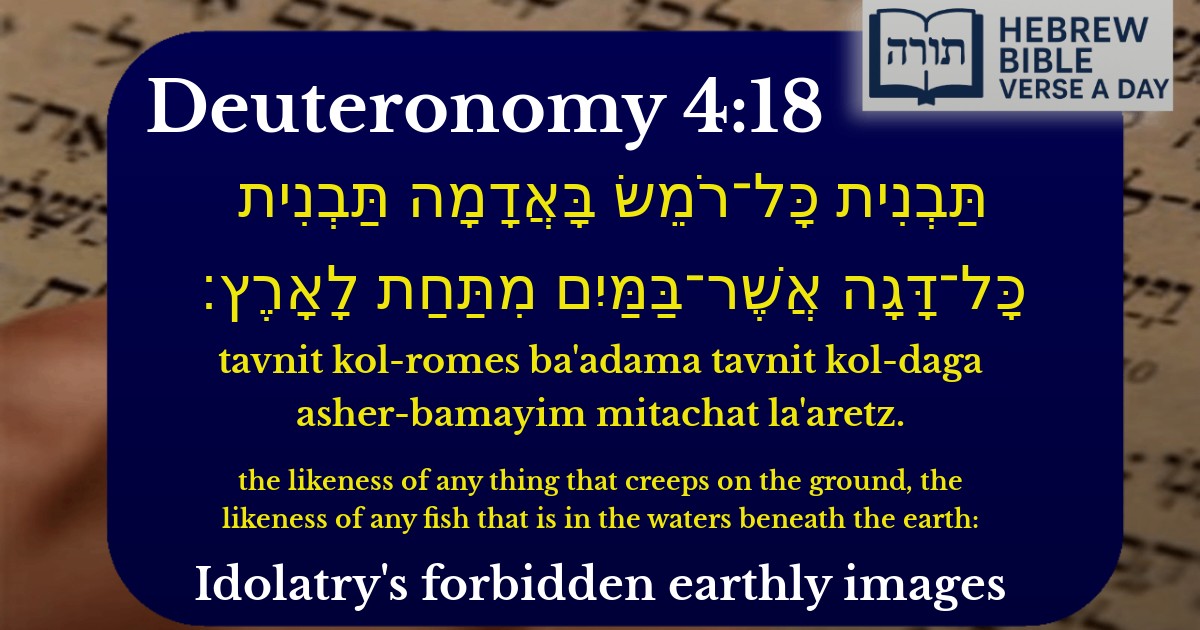Frequently Asked Questions
Q: What does Deuteronomy 4:18 mean?
A: Deuteronomy 4:18 warns against making or worshipping idols in the form of creatures that crawl on the ground or fish in the water. This is part of the Torah's broader prohibition against idolatry (avodah zarah), emphasizing that Hashem cannot be represented by any physical form.
Q: Why is this verse important in Judaism?
A: This verse reinforces the fundamental Jewish belief in Hashem's absolute unity and incorporeality (Rambam's 3rd Principle of Faith). It teaches that no created thing—whether land animals, sea creatures, or anything else—should ever be worshipped or mistaken as divine.
Q: What practical lesson can we learn from this verse today?
A: The verse reminds us to direct our worship only to Hashem and not to material things. Even today, when literal idol worship is rare, this teaches us not to 'worship' modern 'idols' like money, fame, or other distractions that take priority over our relationship with Hashem (based on Talmud, Avodah Zarah 54b).
Q: Why does the Torah specifically mention creeping things and fish?
A: Rashi explains that the Torah specifies these creatures because some ancient cultures actually worshipped such animals. By mentioning both land and sea creatures, the Torah leaves no room for any loopholes—all forms of idolatry are forbidden.
Q: How does this verse connect to the rest of Deuteronomy 4?
A: This verse is part of Moshe's warning to the Israelites before entering Israel, where they would encounter nations that practiced idol worship. The surrounding verses (Deut. 4:15-19) systematically prohibit making images of anything in heaven, earth, or water to prevent any form of idolatry.


Context in the Torah
This verse (Devarim 4:18) is part of Moshe Rabbeinu's warning against idolatry, specifically prohibiting the creation or worship of images resembling creatures of the earth or sea. It follows the prohibition against making graven images of heavenly bodies (Devarim 4:17) and precedes the prohibition against worshiping celestial entities (Devarim 4:19).
Rashi's Explanation
Rashi (Devarim 4:18) clarifies that this verse extends the prohibition beyond three-dimensional idols to include even two-dimensional images ("tavnit") of creeping creatures or fish. He emphasizes that this applies specifically when made for idolatrous purposes, as derived from the context of the passage.
Rambam's Perspective
In Mishneh Torah (Hilchot Avodat Kochavim 3:10), the Rambam rules that creating accurate likenesses of any living creature - whether human, animal, or fish - is prohibited when done in a manner that could lead to idolatrous worship. However, he notes that incomplete or distorted representations (such as a fish missing scales) may be permitted for decorative purposes.
Talmudic Basis
Midrashic Interpretation
The Sifrei (Devarim 32) connects this verse to the incident of the Golden Calf, teaching that the prohibition includes not just worshiping such images but even creating them as representations of divine power. The Midrash emphasizes that God's creations should not be confused with the Creator.
Halachic Applications